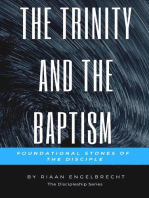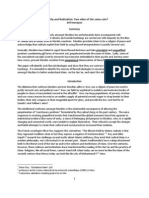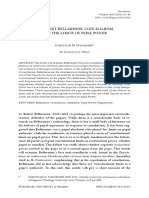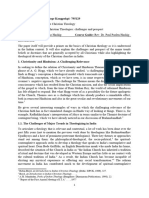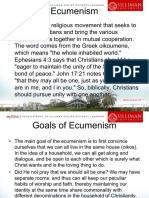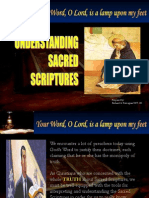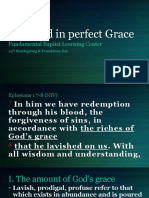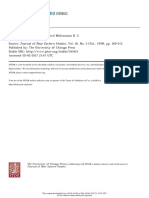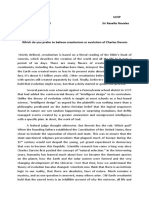0 ratings0% found this document useful (0 votes)
193 viewsSynthesis of Christian Doctrine - Final
Synthesis of Christian Doctrine - Final
Uploaded by
api-260257569Copyright:
© All Rights Reserved
Available Formats
Download as DOCX, PDF, TXT or read online from Scribd
Synthesis of Christian Doctrine - Final
Synthesis of Christian Doctrine - Final
Uploaded by
api-2602575690 ratings0% found this document useful (0 votes)
193 views18 pagesOriginal Title
synthesis of christian doctrine - final
Copyright
© © All Rights Reserved
Available Formats
DOCX, PDF, TXT or read online from Scribd
Share this document
Did you find this document useful?
Is this content inappropriate?
Copyright:
© All Rights Reserved
Available Formats
Download as DOCX, PDF, TXT or read online from Scribd
Download as docx, pdf, or txt
0 ratings0% found this document useful (0 votes)
193 views18 pagesSynthesis of Christian Doctrine - Final
Synthesis of Christian Doctrine - Final
Uploaded by
api-260257569Copyright:
© All Rights Reserved
Available Formats
Download as DOCX, PDF, TXT or read online from Scribd
Download as docx, pdf, or txt
You are on page 1of 18
Running Header: SYNTHESIS OF CHRISTIAN DOCTRINE 1
Synthesis of Christian Doctrine
Sarah Taylor
Wesley Seminary
SYNTHESIS OF CHRISTIAN DOCTRINE 2
Synthesis of Christian Doctrine
I wish I had a full-time ministry setting, or even a regular part-time ministry setting. As
of right now, I have a mostly-sporadic ministry setting in that Im in between churches
(employment wise) and find volunteer opportunities as I can between my regular job in retail and
school work. Growing up in the Methodist church, I tend to find myself in the Methodist church
in which I grew up for both weekly worship and ministry service though admittedly not nearly
as often as I should.
That being said, Ive clearly been raised in the Wesleyan-way of thinking. And while
Ive attended Presbyterian, Nazarene, and Christian churches, primarily Ive found comfort in
the Arminian traditions.
How does that shape my understanding of Christian theology?
I have to think back to what theology is, exactly, and that takes me to Dr. Drurys podcast
comment that theology is always being done, and that it really doesnt take any training to do
theology. Theology a discussion of what forms Christian faith and understanding is what
happens as I begin to make my faith personal. Theology is what happens as I take what Ive
heard regarding Christian doctrine, apply it to my own life, and then take that and pass it on to
others. Its a living and breathing and telling of the faith.
Theology matters simply in that it deepens my own understanding of the major faith
issues basic truths described in the Nicene and Apostles Creeds and hopefully deepens
others understanding as well. Theology deepens my own understanding of Gods grace and the
transforming power it has in my life and others. My theology comes through in how I teach
students in my ministry past, present, and future and how I exhibit the power of Gods grace
in my own life. Its always changing as God uses others to help shape and form my own
SYNTHESIS OF CHRISTIAN DOCTRINE 3
understandings. As my understanding of Christian doctrine becomes clearer, Im more readily
able to express that understanding to others. Thus theology is a process, an ever-changing
process, of understanding and sharing what I believe.
I Believe in God
An understanding of theology begins with an understanding that God, while He makes
Himself known to us in various ways, is ultimately in the greatest sense of the word
unknowable. What I mean by this is God reveals Himself to us in the most ultimate way
through His Son Jesus Christ. We get glimpses of God in other ways through Scripture,
through nature, through other people but, as Daniel Migliore (2004) writes, the revelation of
God is decisively embodied in Jesus Christ (p. 25).
In an article entitled Revelation and Authority it is stated, In faith, the Holy Spirit
reveals the Word of God to us through our physical senses, spiritual sensibilities, and ability to
reason. In all of this, the traditional teachings of the Church serve as a guide for our faith. In
short, I meet God not only through Scripture, but through nature through the majestic views of
mighty oceans and through intellectual discourse. I encounter God through my encounters
with other Christians, and even non-Christians.
As Migliore notes two distinct modes of revelation general and special it can be
dangerous to put limits to the ways in which God can reveal Himself. God revealed Himself to
Moses in a burning bush, spoke audibly to many in Scripture, and revealed Himself in the
incarnation of Jesus. If we expect God to speak in the exact same ways, Im afraid well
ultimately wind up disappointed. To limit God to an audible revelation, as such, would be to
possibly miss His revelation by some other means. To constantly seek God in the sunset would
SYNTHESIS OF CHRISTIAN DOCTRINE 4
be to ignore the sunrise and all its possibilities. To seek God in the ocean waves would be to
turn my back on the mountains.
The Father Almighty
An understanding of the revelation of God to humanity is also an understanding of the
triune identity of God. God revealed Himself through Jesus Christ and the sending forth of the
Holy Spirit as Migliore writes, The reality of the one God cannot be separated from Gods love
for the world in Jesus Christ and his renewing Spirit (p. 68).
The idea of Gods unity in three persons (Father, Son, and Spirit) can be a dangerous
topic one in which the Christian faith can fall into confusion and heresy. Paul Fiddes (2000)
writes, the doctrine of the Trinity can be reduced to [a] mathematical puzzle [], in which God
is seen as the supreme individual and three individuals at the same time, [or it can] foster the
view [that] the threeness in God is what is mysterious (p. 17).
Ultimately the understanding of the Three-in-One doctrine is an understanding of Gods
nature. As Dr. Bounds comments, Their "oneness" is in regard to nature. And because they
have the same nature, they have the common attributes of that nature. Whatever the divine nature
is, the Father has that nature, the Son has that nature, and the Holy Spirit has that nature
(discussion forum). As the United Methodist Articles of Religion state, And in unity of this
Godhead there are three persons, of one substance, power, and eternitythe Father, the Son, and
the Holy Ghost.
In that they are of the same nature, an understanding that they are also distinct, I think, is
in and where the confusion can lie. God the Father while in the same nature as Jesus is separate
in that Jesus is Gods eternally begotten son begotten, not made sent as a baby to reconcile
the world to Him. In that they are the same, Jesus through God breathes out the Spirit upon His
SYNTHESIS OF CHRISTIAN DOCTRINE 5
ascension to heaven. A fuller understanding of the Trinity is to understand that God, while one in
divine nature of one substance with Jesus and the Spirit, is equally distinct.
In this we see God as Father and as Creator, but we also must see God in the broader
picture of who He is. Migliore writes the key to a Christian doctrine of the divine attributes
[] in a trinitarian understanding of God [is] centered in the person and work of Jesus Christ
(p. 84). In this, through Christ, we can learn more of who God is attributes Migliore notes as
constancy of purpose the reconciliation of humanity to Himself. We see Gods unchanging
constant power and love in the sending of His son for the redemption of humanity. And we see
Gods wisdom (omniscience) and patience through Jesus. Migliore writes, Gods wisdom is
exercised both in righteous judgment and in patient love (p. 86) clearly exhibited in Christ. God
is a God of communion and He longs to share in that communion with us to share in love and
grace the ultimate purpose of His design a longing of life in full communion. We get a sense
of that longing in the creation story.
Maker of Heaven and Earth
To attribute God the Father as Creator is the foundation of the Christian faith. To
understand this is to first understand that God created everything as stated in the Nicene Creed
everything seen by the naked eye and everything we cant see. Attributing God as Creator,
according to Migliore, is to affirm the very essence of otherness, transcendence, and lordship of
God it is also to acknowledge our radical dependence on the Creator (p. 100-101). Clearly
without the Creator we would not exist.
God as Creator is to also acknowledge a very relational God, a very personal and loving
God, a God who personally loves and cares for His creation. God spoke light into the darkness
SYNTHESIS OF CHRISTIAN DOCTRINE 6
of nothing (Genesis 1), creating the world from nothing just by speaking it into being. Life on
Earth is a very personal, individual, intentional thing as God speaks each creature into being.
To acknowledge God as creator is to also acknowledge, writes Migliore, that creation is
inherently good (p. 103) but fallen. That sin entered into the world marred our once-perfect
relationship with God. Daniel Migliore writes that sin is the denial of our essential relatedness
to those who are genuinely other (p. 150). If we ultimately deny our need for the Other found
in God as well as our need and interdependence on other creatures we find ourselves alone and
desolate. This denial of our need for God is the basis for sin as Adam and Eve chose to act on
their own, with little regard to Gods word, as they ate from the tree in the garden. This denial of
God claims we are self-sufficient. This understanding that we no longer need God is where sin
takes hold and, if were not careful, can take full control.
The introduction of sin into the world requires us to acknowledge a change in our
relationship to God. It does not mean that God has stopped loving and caring for us, but that we
are in fact situated at a distance from God that only Jesus can bridge. God is still at work in
creation, rectifying our fallen nature to Himself. An understanding of God as Creator is to
acknowledge not only His providence in power as creator, but that God chose to create and did
so in communion with the Son and Holy Spirit. He created humanity with the will to choose, and
through all of this, as Migliore writes, longs to have communion with His creation. But as
Migliore also writes, The God who wills to have communion with creatures gives them freedom
to return love for love. In providence no less than in creation and redemption, God is the
gracious Lord (p. 127).
SYNTHESIS OF CHRISTIAN DOCTRINE 7
Migliore makes it clear, though, the consideration of God the Father cannot be taken
separately from the person of His son Jesus. We must see how, as the Triune God with distinct
attributes, they are ultimately one in the same flowing from each other.
And in Jesus Christ, His only Son
While Migliore writes that one problem, when considering the Person of Jesus, is the
awareness of the remarkable variety of pictures of Jesus in the New Testament (p. 165) it
cannot be ignored the many pictures of Jesus in modern day culture. It seems Jesus takes on the
guise as needed by each individual based on their given situation something I, myself, have
been guilty of doing. One of my favorite writers, Matt Mikalatos (2010), weaves a story based
on his journey to discover the real Jesus. In his story while Jesus follows him everywhere, even
to lunch at a local vegan diner, he encounters Pete a Christian fisherman from Portland. In
talking about Matts Jesus, he says:
What I mean is, heres God, the creator of the universe. He becomes a human being and
lives on Earth for thirty-three years. He completely assimilates to human culture. Wears
our clothes. Wears a body like ours. Eats our food. But here he is, two thousand years
later, and hes still wearing robes and a sash. Seems like he might put on a pair of jeans
every once in a while (p. 6).
While it may be important, even necessary, to fit the Jesus of history, the Jesus of
Scripture into our modern context, it cannot be ignored who that Jesus is. We cannot and must
not lose sight of who the real Jesus is. As Migliore writes, In him the perfect love of God and a
perfect human response are one (p. 182).
Jesus is the eternal begotten son of God. Being of one nature with God, Jesus was with
God from the beginning and continues to be with God today. As declared in the Formula of
SYNTHESIS OF CHRISTIAN DOCTRINE 8
Chalcedon, He is of one substance with the Father according to deity, and of one substance with
us according to humanity. Similarly stated in the Methodist Articles of Religion, The Son,
who is the Word of the Father, the very and eternal God, of one substance with the Father, took
man's nature in the womb of the blessed Virgin; so that two whole and perfect natures, that is to
say, the Godhead and Manhood, were joined together in one person, never to be divided. While
fully one with God, it is Jesus humanity that brings God into our presence, making Him fully
one with humanity. As one article entitled Biblical Doctrine: The Person of Jesus Christ notes,
From the moment of Marys virginal conception of Jesus, his divine nature became permanently
united to his human nature in one and the same person, the now incarnate Son of God
(gospelcoalition.org pdf). In this humanity, Jesus joins in the suffering of humanity, in the
human trials of temptation, of physical needs and desires hunger, pain, thirst, and emotional
desires anger, frustration, happiness, and sorrow. This humanity not only brings God to our
level, but allows us to see God more fully through Jesus eyes.
While some in history have placed emphasis on Jesus humanity (Antiochian school) and
others on Jesus deity (Alexandrian school) the Council of Chalcedon (451 A.D.) makes it clear
the emphasis on the person of Jesus and his divine nature cannot be split. While Jesus is fully
human He is also and ultimately fully God the human incarnation of the divine - Migliore
writes, The humanity of Jesus Christ comes to personhood only in union with the Word of God
(p. 172). And as he later writes, it is precisely in this person, [that] divinity and lordship are
radically redefined in terms of a surprising love that welcomes sinners, makes itself vulnerable
for the sake of others, and is shockingly partisan toward the weak, the poor, and the outcast (p.
178). Jesus identity is not only defined by his deity and humanity, but also by His actions as
well as seen in His radical love for the least of these (Matthew 25:40).
SYNTHESIS OF CHRISTIAN DOCTRINE 9
Our Lord - The Work of Jesus
It is in conjunction with Christs humanity and divinity that we must also consider the
roles Jesus played throughout His ministry including the significance of His radical love. As
Migliore notes John Calvins teaching concerning the three offices of Christ (prophet, priest, and
king) he writes, Christ as prophet proclaims the coming reign of God and instructs us in the
form of life appropriate to that reign (p. 186). Through Christs ministry and teaching we see
Him take the role of prophet, or moral teacher it is only through His divine nature that He can
adequately claim this role, to preach the forgiveness of sins, to heal the sick and love the
unlovable. Perhaps the greatest example is found in the Sermon on the Mount as Jesus instructs
on Kingdom living living out acts of forgiveness and love as exemplified in His own life. Only
through His divine example can he speak with such authority.
Migliore continues, Christ as priest renders to God the perfect sacrifice of love and
obedience on our behalf (sanctification) (p. 186). As written in Pauls letter to the Romans,
But God demonstrates his own love for us in this: While we were still sinners, Christ died for us
(Romans 5:8). Jesus death on the cross is Gods most prolific expression of love for His
creation. It is precisely the reason that Jesus was sent by God to take on humanity the physical
act of love as evidenced in Christs death on the cross. It is only through Christs human death
that creation, fallen into sin as a result of Adam and Eves fall in the Garden, can find healing of
their broken relationship with God (justification).
As John Wesley teaches, Christs death on the cross is the forgiveness of all our sins;
and, what is necessarily implied therein, our acceptance with God. The price whereby this hath
been procured for us (commonly termed "the meritorious cause of our justification"), is the blood
and righteousness of Christ (Sermon 43). This act of justification is not something we earn, but
SYNTHESIS OF CHRISTIAN DOCTRINE 10
is a free gift of Gods grace. David Englesma writes concerning Christs death, The basis is
both Christs lifelong obedience to the law of God, and Christs death as complete and perfect
satisfaction of Gods justice regarding the elect sinners guilt
(http://www.reformedspokane.org). It is only through Christs sacrifice His act as priest,
standing before God on our behalf, as well as Lamb unblemished sacrifice that we can find
our place alongside God restored.
The third office of Christ, perhaps the most chills-inducing image is that of king.
According to Migliore this image portrays Christ as designated king [ruling] the world despite
the recalcitrance of evil and promised the ultimate victory of God (p. 186). Christ as king is the
image we see in the Johns Revelation the image of Christ sitting on the throne holding the
keys to death and Hades (Revelation 1:18). Jesus is the ultimate victor over death rising from
the dead and declaring our sins forgiven.
Migliore makes note of several dimensions concerning the resurrection theological,
Christological, pneumatological, ecclesial, political, and cosmic. In as such we see Christ
exalted in His victory over death, an ushering in of the new creation. As Migliore notes, Christ
died for us in order to open, in the midst of our violent world, a new future of reconciliation and
peace for a new humanity and a new creation (p. 191). We see this in Christ as he becomes
what the apostle Paul refers to as the first fruits of that new creation through his resurrection.
As the Methodist Articles of Religion state, Christ did truly rise again from the dead,
and took again his body, with all things appertaining to the perfection of man's nature, wherewith
he ascended into heaven, and there sitteth until he return to judge all men at the last day.
In his ascension, we see His exaltation in His position next to God in His role as judge for
all mankind. We see the fullness of the three offices of Christ. Clearly Jesus is not just one, or
SYNTHESIS OF CHRISTIAN DOCTRINE 11
the other in this discussion of offices. The whole of Christs identity is found in all three offices
much like the whole of Christ is found in his humanity and divinity. Jesus is the perfect
prophet and moral teacher as He flawless exemplifies a life lived in accordance to Gods will
the necessity of his humanity clearly exemplified. He is equally the perfect priest as He stands in
our stead, dying for our sins the necessity for his divinity clearly exemplified. And He is the
ultimate victor over the forces of Evil as He defeats death, ruling forever as King at the right
hand of God.
I Believe in the Holy Spirit
Upon Christs ascension into Heaven, were told in Scripture of His breathing out of the
Holy Spirit the mediator, the Great Communicator sent to accompany us in Christs absence, to
bridge that gap between our world and Jesus place in heaven. As John writes in his gospel,
Again Jesus said, Peace be with you! As the Father has sent me, I am sending you. And with
that he breathed on them and said, Receive the Holy Spirit (John 20:21-22). Being the third
person of the Trinity, the Spirit is equally divine in nature as God the Father and God the Son.
As stated in the Methodist Articles of Religion, The Holy Ghost, proceeding from the Father
and the Son, is of one substance, majesty, and glory with the Father and the Son, very and eternal
God. It is through this unique person of the Trinity that we find communion with God possible
in our fallen state.
Considering the work of the Holy Spirit, Im taken back to John Drurys question of
How do we discern the Spirits leading in our lives? And while I equate most of the Spirits
work to a feeling in my life a feeling of peace, of joy, of nervous excitement I cant help but
find Daniel Migliores (2004) comments to be quite sound. He writes, The power of the Spirit
(in Christian life) is a dynamic process of transformation into the likeness of Christ that is set in
motion by the gracious initiative of God (p. 235). It is through the grace of God and the power
SYNTHESIS OF CHRISTIAN DOCTRINE 12
of the Spirit that we are made right (justified) in our relationship with God. Through
justification, the life we once knew becomes obsolete. The mistakes and sins we made before
our relationship with Christ are wiped clean. Migliore writes, That we are justified means that
our broken relationship with God has been restored (p. 236).
This power of the Spirit to restore through justification begins the process of
sanctification - growth toward perfection in Christian love. What does this mean? It means that
sanctification is a freedom in the Spirit a heightened readiness to be servants in Gods work of
reconciliation in Christ. [It is a] struggle against hostility, injustice, and other evils at work(p.
243). It is a freedom to partner with God in loving others openly and freely, the only way God
loves us.
Is the realization of entire sanctification a possibility in this lifetime? Does that mean we
can live a life free of the power of sin? I have to think the answer to both of these questions is
YES! Does sin become non-existent? No, but through the Spirit we are given the power to
overcome sins pull on our lives. As Keith Drury writes concerning sanctification, the most
dramatic effect was a fresh power over sin. []Loving Christ made it easy to obey Him. THE
GREATEST SINGLE EVIDENCE of the sanctified life is not perfect living so much as perfect
lovingresulting in a perfect desire.
And while perfect living may not be accessible in this life that desire to achieve it
grows stronger the deeper I grow in my relationship with Christ. Jesus never sinned. Was this
because of His divine nature? I dont think so. We see the Divine in His healings, in His power
over nature, and His forgiveness of sins. Did He access this divine nature to live a life free of
sin? No. Why not? He had to show us a reachable example. Do I think Ill achieve this
SYNTHESIS OF CHRISTIAN DOCTRINE 13
freedom from sin in my lifetime? Im inclined to say no, but that wont keep me from striving to
live my life as Christ lived His.
The Holy Catholic Church
We can equally see the power of the Spirit in the mission and body of the Church. The
Church being the body of Christ, we see Christs mandates (the Great Commission as found in
Matthew 28, for example) lived out through actions of the body, or gathering of believers in
Jesus Christ. It is through the Church that Gods word and grace is made known to the world. It
is through this body of believers that Jesus is made known to the world. As the Methodist
Articles of Religion state, The visible church of Christ is a congregation of faithful men (and,
can be assumed, women) in which the pure Word of God is preached, and the Sacraments duly
administered according to Christ's ordinance, in all those things that of necessity are requisite to
the same.
It is the churchs mission to be the full embodiment of Christ. If the church is not
actively living out the teaching of the Gospel, something is missing. To understand that the
mission of the church is to DO, not just BE, is crucial in actualizing the true embodiment of
Christs commission (Matthew 28).
Marks of the Church
Teaching the Word: it is the churchs mission to preach the gospel message of Christs
love. Through this, the church not only speaks forth that teaching but also lives out that message
actively. It is through the teaching of the word and the practice of the sacraments that one can
easily recognize the church as set apart.
To consider the practice of sacraments we must first understand what those sacraments
are. According to the Methodist Articles of Religion, Sacraments ordained of Christ are not
only badges or tokens of Christian men's profession, but rather they are certain signs of grace,
SYNTHESIS OF CHRISTIAN DOCTRINE 14
and God's good will toward us, by which he doth work invisibly in us, and doth not only
quicken, but also strengthen and confirm, our faith in him. They are practices that encourage
our growth as believers and strengthen our faith and encourage us to continue to grow in our
relationship with God. Some of those sacraments being the sacraments of baptism (initiation
into the Christian faith as practiced by Jesus via John the Baptist through emersion of water
signifying the cleansing of ones sins) and the Lords Supper (the breaking of bread as signified
by Christ in the Upper Room at Passover) are perhaps the two most profound. Encouraging
other sacraments corporately and individually are equally important. Practices of solitude,
prayer, fasting, and Christian fellowship while perhaps viewed as Christian disciplines
perhaps should be equally practiced to model the life of Christ more closely.
When I look at the church today, Im not so sure Im seeing the church as Christ
intended. Is there sound teaching of Scripture? Yes, for the most part I can say there is. Is there
practice of the sacraments baptism, Holy Communion, etc.? Yes. Is there outward motion of
the body reaching out beyond the walls of the church to the surrounding community? I think
the church is trying.
The epitome of the churchs mission can be found in the words of Jesus to the disciples
Therefore go (Matthew 28:19). Jesus calls the church to action, to spread the gospel
message of Gods love. We see this actively in the early church as the disciples continue to tell
the world of Christs life, death, and resurrection. The church today should be equally founded
in the actions and teachings of the first apostles, what Daniel Migliore refers to as apostolic
succession (p. 272). To see a church consistently sitting in the church pew, with little to no
outward movement is disheartening and troublesome.
SYNTHESIS OF CHRISTIAN DOCTRINE 15
When I think of the churchs mission, though, I cant help but refer back to Pauls
statement in his first letter to the Corinthian church. To the Jews I became like a Jew, to win the
Jews. To those under the law I became like one under the law (though I myself am not under the
law), so as to win those under the law (1 Corinthians 9:20). Paul clearly makes a case for
reaching out beyond the proverbial church walls to reach outsiders with the message of the
gospel. But as Timothy Tennent (2007) makes a case, the first job of missionaries is to enter
into the experience and life-view of those they are seeking to reach (p. 207), this cant be done
at the expense of our identities as found in Christ.
So what can be said the true mission of the church is? To teach the fullness of Scripture
and the story of Gods love for His creation in such a way as to equip believers to share the story
outwardly, to encourage Christian growth through practices of baptism, Communion and other
Christian practices of prayer, solitude, etc., to reach out into the community with Christs
message of love, to live out that message actively and fully in service to others. Only when the
church is active outwardly can we see the full power of the Spirit at work and thus begin to see
the purpose of Christ fulfilled.
The Resurrection of the Body and the Life Everlasting
For only when that purpose is fulfilled can we experience the fulfillment of Gods
kingdom and full reconciliation of creation to Him. When Jesus ascended to Heaven, there has
always been the expectation of His return. Quite like the early church in Acts, we can often get
caught staring at the sky awaiting His return and lose sight of what our mission as the church is.
It can easily be said that we simply cant say how things will culminate in the end, when
Gods kingdom is finally made known to the fullest extent. Will Christ reign for a thousand
years following a seven-year tribulation period? Possibly. Will all believers be caught up in
SYNTHESIS OF CHRISTIAN DOCTRINE 16
rapture to escape this supposed tribulation period? Maybe. And while we may not be able to
speak with authority as to WHAT will happen, we can speak with authority that, in some way, it
WILL happen. As its written in 1 Thessalonians 4: 16-17,
For the Lord himself will come down from heaven, with a loud command, with the voice
of the archangel and with the trumpet call of God, and the dead in Christ will rise first.
After that, we who are still alive and are left will be caught up together with them in the
clouds to meet the Lord in the air. And so we will be with the Lord forever.
We have the promise of God to be made right again, to see the whole of creation brought
back into a right relationship with God. And while death may seem final in so many ways, death
is simply a step in our journey toward that new creation, to realizing our own renewal in body
the very embodiment that Christ exhibited at His own resurrection one of freedom from pain,
from sin, from sorrow. It is a body of physical perfection as originally intended at the initiation
of our creation.
We can know with certainty that as we approach the day of Gods calling us to Him, we
will find our true identity in Christ. The eyes through which we see will be opened, our bodies
renewed to their original glory, and our hearts opened to the complete fullness of Gods love.
And while it must be noted that not all will experience this freedom in new life. With Jesus as
the final judge He will separate the righteous from the unrighteous, the just from the unjust.
Those found in right relationship with God will be taken to their final glory in Gods presence.
Those that God has not known in life will cast out from His presence for all eternity.
It is through this certainty of glory that Christians can find hope to make it through life
now, the journey to become the church in its fullest capacity. It is through this certainty of final
judgment that Christians should continue reaching out with increased fervor to reach those
unreached by the gospel message. As Migliore writes, As we wait, pray, and work for Gods
transformed world in which life will flourish and the forces of evil, death, and destruction will be
SYNTHESIS OF CHRISTIAN DOCTRINE 17
overcome, we learn the meaning of hoping in god rather than in our own abilities and
achievements (p. 351). It is our purpose as the body of Christ to wait and hope for that day
while remaining faithful in our mission today to share the gospel of Gods [] unbounded
love; to struggle against the forces of violence and death; [] to hasten and wait for the
consummation of Gods purposes for the world (p. 352).
Because in the end, the worries of what will happen and when will pale in comparison to
our being forever in the presence of God. Because we know its coming. One day, it is coming
where we will one day bow at the very feet of God the Father, walk hand-in-hand with God the
Son and experience the fullest communion with the Triune God in body and spirit. So much like
the hymn It is Well (with my Soul) says; And Lord, haste the day when my faith shall be sight.
The clouds be rolled back as a scroll. The trumpet shall sound and the Lord shall descend. Even
so, it is well with my soul.
Amen!
SYNTHESIS OF CHRISTIAN DOCTRINE 18
Sources:
Biblical doctrine: The person of Christ. Retrieved from: thegospelcoalition.org/pdf-
articles/ThePersonofChrist.pdf
Drury, K. 2003. Sanctification One guys testimony. Retrieved from:
http://www.tuesdaycolumn.com
Englesma, D. Justification and Good Works. Retrieved from:
http://www.reformedspokane.org/Doctrine_pages/Reformed/Reformed%20Doctrine%20
pages/Justification/Justification2.html
Fiddes, P. (2000). Participating in God: A Pastoral Doctrine of the Trinity. Louisville, KY:
Westminster John Knox Press
Migliore, D. (2004). Faith seeking understanding. Grand Rapids, MI: Eerdmans Publishing
Mikalatos, M. 2010. My imaginary Jesus. Carol Stream, IL: Tyndale Publishing
Point Loma Nazarene Univ. (2012) Revelation and authority: God's word revealed in Scripture
and nature. Retrieved from: http://www.pointloma.edu/experience/academics/centers-
institutes/wesleyan-center/our-wesleyan-tradition/iii-revelation-and-authority-gods-word-
revealed-scripture-and-nature
Tennent, T. 2007. Theology in the context of world Christianity. Grand Rapids, MI: Zondervan.
United Methodist Articles of Religion Retrieved from: http://www.umc.org/what-we-believe/the-
articles-of-religion-of-the-methodist-church#sacraments
Wesley, J. The scripture way of Salvation: Sermon 43. Retrieved from:
http://wesley.nnu.edu/john-wesley/the-sermons-of-john-wesley-1872-edition/sermon-43-
the-scripture-way-of-salvation/
You might also like
- Watchtower: Preparation by J.F. Rutherford, 1933Document366 pagesWatchtower: Preparation by J.F. Rutherford, 1933sirjsslut67% (3)
- Discipleship Transforming The World: Wedad A. TawfikDocument12 pagesDiscipleship Transforming The World: Wedad A. TawfikKarim Atef GuirguisNo ratings yet
- Theology and Faith: Chapter 1 Unit 1Document43 pagesTheology and Faith: Chapter 1 Unit 1Xyrzch Love EscasinasNo ratings yet
- Pierre de Lasenic - Hermes Trismegistos and His Initiation PDFDocument25 pagesPierre de Lasenic - Hermes Trismegistos and His Initiation PDFMathew LoveNo ratings yet
- Jesus Represents All Humanity: Interviews With Christian KettlerFrom EverandJesus Represents All Humanity: Interviews With Christian KettlerNo ratings yet
- The Trinity and the Baptism: Foundational Stones of the Disciple: DiscipleshipFrom EverandThe Trinity and the Baptism: Foundational Stones of the Disciple: DiscipleshipNo ratings yet
- A Study of The Trinity in The Cappadocian FathersDocument105 pagesA Study of The Trinity in The Cappadocian FathersAlexNo ratings yet
- Muslim ReligiosityDocument18 pagesMuslim ReligiosityNauman AhmedNo ratings yet
- Personhood: An Essential Characteristic of The Human SpeciesDocument25 pagesPersonhood: An Essential Characteristic of The Human SpeciesMary bethany ocampo100% (1)
- Roman CatholicismDocument5 pagesRoman CatholicismALIENHMBNo ratings yet
- Importance of Jerusalem Council TodayDocument4 pagesImportance of Jerusalem Council TodayTintumon DeskNo ratings yet
- Maturity in Interpersonal RelationshipsDocument6 pagesMaturity in Interpersonal Relationshipsmaduragayakan100% (1)
- Have Sacraments ChangedDocument5 pagesHave Sacraments Changedherbert23No ratings yet
- EducationDocument10 pagesEducationKiran DNo ratings yet
- Protestant ReformationDocument6 pagesProtestant Reformationnipunchoudhary12No ratings yet
- Concept of PostmodernismDocument7 pagesConcept of Postmodernismumair saleemNo ratings yet
- The Response of The Early Church To Major Heresies 2Document6 pagesThe Response of The Early Church To Major Heresies 2NatyNo ratings yet
- Vengoor, Ayur, Kerala: Ebenezer Theological SeminaryDocument4 pagesVengoor, Ayur, Kerala: Ebenezer Theological SeminaryAnkam ManideepNo ratings yet
- The Christian Vision of The Person and SocietyDocument8 pagesThe Christian Vision of The Person and SocietyLeonardo BritoNo ratings yet
- Dogmatism and ScholasticismDocument5 pagesDogmatism and ScholasticismJwngma Bright BasumataryNo ratings yet
- ST Robert Bellarmine Conciliarism and The Limits of Papal Power - Christian D. WashburnDocument20 pagesST Robert Bellarmine Conciliarism and The Limits of Papal Power - Christian D. WashburnNama PalsuNo ratings yet
- Method in Dogmatic Theology: Protology (First Revelatory Mystery at Creation) To Eschatology (Last RedemptiveDocument62 pagesMethod in Dogmatic Theology: Protology (First Revelatory Mystery at Creation) To Eschatology (Last RedemptiveefrataNo ratings yet
- Our Changing WorldDocument3 pagesOur Changing Worlddinesh869863% (8)
- MissioDocument5 pagesMissioamosabiaktluangaNo ratings yet
- Moral Teachings in CatholicDocument23 pagesMoral Teachings in CatholicBrenda Macanlalay AsuncionNo ratings yet
- Semi PelagianismDocument1 pageSemi PelagianismtwinscrewcanoeNo ratings yet
- Cyber Ethics IssuesDocument8 pagesCyber Ethics IssuesThanmiso LongzaNo ratings yet
- Philosophy and Sociology of ScienceDocument6 pagesPhilosophy and Sociology of SciencereginNo ratings yet
- MTH Application Form 2025Document13 pagesMTH Application Form 2025David Lalnunthara DarlongNo ratings yet
- ICTEcclesiologyseminarDocument11 pagesICTEcclesiologyseminarbibin100% (1)
- Test 1 Study Guide Answers - 2017-2018Document3 pagesTest 1 Study Guide Answers - 2017-2018Po TapNo ratings yet
- Theology of EvangelisationDocument5 pagesTheology of EvangelisationCidroy FernandesNo ratings yet
- All About ChristologyDocument15 pagesAll About ChristologykjhrscbnjtdnNo ratings yet
- Assignment Role of Women in The Early ChurchDocument10 pagesAssignment Role of Women in The Early ChurchSIMEON BALINo ratings yet
- Good and RightDocument19 pagesGood and RightHarshita RanjanNo ratings yet
- Benedict Pastoral CounselingDocument9 pagesBenedict Pastoral CounselingShekwonuchyi BenNo ratings yet
- Unity in ChurchDocument7 pagesUnity in ChurchKhual Suan SumNo ratings yet
- Minister of Life: - Latin Word Meaning: "Servant." - Serviamus-To ServeDocument11 pagesMinister of Life: - Latin Word Meaning: "Servant." - Serviamus-To ServeJose Daniel AbucejoNo ratings yet
- Pastoral Care and Marriage Reflection PaperDocument2 pagesPastoral Care and Marriage Reflection PaperEvan Rhy Lisondra GalvezNo ratings yet
- Contextual TheologiesDocument3 pagesContextual TheologiesTiaka JamirNo ratings yet
- 4 Sources of Moral TheologyDocument46 pages4 Sources of Moral TheologyRenson Rivera QuerijeroNo ratings yet
- Ethical FoundationDocument11 pagesEthical FoundationZoro 2000No ratings yet
- Lecture 3 (The Metaphors and Images of The Church)Document5 pagesLecture 3 (The Metaphors and Images of The Church)Reegan SamsonNo ratings yet
- The Relevance of Juergen Moltmann's Trinitarian Theological Anthropology To The Problem of The Behavioural Custom of Masking 2014-9-19Document70 pagesThe Relevance of Juergen Moltmann's Trinitarian Theological Anthropology To The Problem of The Behavioural Custom of Masking 2014-9-19Tsung-I HwangNo ratings yet
- Basic Christian Doctrine Module 1Document26 pagesBasic Christian Doctrine Module 1francis_lee_9No ratings yet
- Human Person: Moral BeingDocument15 pagesHuman Person: Moral BeingMinerva Agrito LautrizoNo ratings yet
- Theology and EthicsDocument3 pagesTheology and EthicsBen80% (5)
- ICT Sir pAOLENDocument7 pagesICT Sir pAOLENThangtinpao HaokipNo ratings yet
- The Church As The Body of Christ'Document6 pagesThe Church As The Body of Christ'lity sanegar100% (2)
- Contemporary Theology Notes 1Document13 pagesContemporary Theology Notes 1api-3713477200% (1)
- Golden Rule Theory Exegesis and Application of Matthew 7 To The Contemporary BelieverDocument9 pagesGolden Rule Theory Exegesis and Application of Matthew 7 To The Contemporary BelieverGodswill M. O. UfereNo ratings yet
- Environmental EthicsDocument6 pagesEnvironmental EthicsElí GutierrezNo ratings yet
- Significance of Luther's Hermeneutics!Document22 pagesSignificance of Luther's Hermeneutics!Rh2223dbNo ratings yet
- Theology of Children - Karl RahnerDocument9 pagesTheology of Children - Karl RahnerJoel ThomasNo ratings yet
- Soares-Prabhu PrinciplesDocument31 pagesSoares-Prabhu Principlesvihari hannahNo ratings yet
- Social Structure, Ideology and Language-Caste Among MuslimsDocument4 pagesSocial Structure, Ideology and Language-Caste Among MuslimsuvaisahamedNo ratings yet
- Interfaith and EcumenismDocument39 pagesInterfaith and EcumenismJeorge QuiboyNo ratings yet
- Unit 1. Human EmotionsDocument3 pagesUnit 1. Human EmotionsJoe Faustino100% (1)
- Cultural Anthropology Reading - Mission and AnthropologyDocument9 pagesCultural Anthropology Reading - Mission and AnthropologylidicemeyerNo ratings yet
- 5 - Interpretation of ScripturesDocument29 pages5 - Interpretation of ScripturesmargarettebeltranNo ratings yet
- The Asian Family Toward A Culture of Integral Life FabcDocument57 pagesThe Asian Family Toward A Culture of Integral Life FabcJoe Philip100% (1)
- Christian Ethical Response With The Weak and VulnerableDocument3 pagesChristian Ethical Response With The Weak and VulnerableMikoi LangzyaNo ratings yet
- Comparison Grid - CreationDocument3 pagesComparison Grid - CreationRex EvangelistaNo ratings yet
- Songs Jan21Document2 pagesSongs Jan21Vijay Babu KoreboinaNo ratings yet
- Lavished GraceDocument15 pagesLavished GraceglazegamoloNo ratings yet
- WolfshookedcrossDocument8 pagesWolfshookedcrossKinguAmdir-Ush100% (1)
- Seal of The Living God MarathiDocument1 pageSeal of The Living God MarathizepoliNo ratings yet
- Lyrics and Translation of Bhavani AshtakamDocument3 pagesLyrics and Translation of Bhavani Ashtakamd_ashwitha9328No ratings yet
- James Thomson (Vanes Story) PDFDocument208 pagesJames Thomson (Vanes Story) PDFbeto3164No ratings yet
- Diocese of Tarlac Sto. Cristo Parish Burot, Tarlac City: Ang Banal Na MisaDocument143 pagesDiocese of Tarlac Sto. Cristo Parish Burot, Tarlac City: Ang Banal Na MisaSto Cristo ParishNo ratings yet
- 34-3 NUMBERS CH 25-36Document84 pages34-3 NUMBERS CH 25-36zetseatNo ratings yet
- Another GospelDocument3 pagesAnother GospelJim Patrick CastilloNo ratings yet
- The Order of Phosphorus: Grade 0) Void and The AbyssDocument28 pagesThe Order of Phosphorus: Grade 0) Void and The Abyssjonathan bascuñan sanchez100% (2)
- Greek Goddes Athena WikiDocument39 pagesGreek Goddes Athena WikimagusradislavNo ratings yet
- Anthes - Egyptian Theology in The 3rd Mill BC - 1959Document45 pagesAnthes - Egyptian Theology in The 3rd Mill BC - 1959rupert11jgNo ratings yet
- UCSPDocument2 pagesUCSPRohanie shaquin BasucaoNo ratings yet
- Baphomet UnveiledDocument22 pagesBaphomet UnveiledMidnite Scholar100% (6)
- SuperstitionDocument5 pagesSuperstitionZwesty RimbaNo ratings yet
- Spiritual Warfare PrayerDocument17 pagesSpiritual Warfare Prayereltropical100% (1)
- RaysofFaithNotes QabeelatIhsaanDocument71 pagesRaysofFaithNotes QabeelatIhsaanNur KhairunnisaNo ratings yet
- 12.shabbatai Zvi and Abraham Miguel Cardozo - How Much Similar, How Much Different - Felicia WaldmanDocument10 pages12.shabbatai Zvi and Abraham Miguel Cardozo - How Much Similar, How Much Different - Felicia WaldmanMehmed DavudoğluNo ratings yet
- Zeus in The Iliad and in The Odyssey. A Chorizontic ArgumentDocument3 pagesZeus in The Iliad and in The Odyssey. A Chorizontic ArgumentAlvah GoldbookNo ratings yet
- Apparent Contradictions Between The Spirit of Prophecy and The Shepherd's RodDocument17 pagesApparent Contradictions Between The Spirit of Prophecy and The Shepherd's RodUniversal Publishing AssociationNo ratings yet
- JOYCE MEYER - JESUS TORTURED IN HELL. PART Three 05-27-10 PDFDocument19 pagesJOYCE MEYER - JESUS TORTURED IN HELL. PART Three 05-27-10 PDFCHRISTIAN BOOKSNo ratings yet
- Psyche and CupidDocument13 pagesPsyche and CupidPolorenze IbarraNo ratings yet
- Mitologias Do NorteDocument12 pagesMitologias Do NorteHellenah LeãoNo ratings yet
- Notes From Jeffrey Burton RussellDocument3 pagesNotes From Jeffrey Burton RussellbmarksNo ratings yet
- Archives in English 10 Hestia 31Document101 pagesArchives in English 10 Hestia 31JohnmarkNo ratings yet
- Advanced Course Number 1, Lesson 8Document10 pagesAdvanced Course Number 1, Lesson 8ArthurNo ratings yet
- G0110, AthanasiaDocument41 pagesG0110, AthanasiaEduardo BarrientosNo ratings yet





